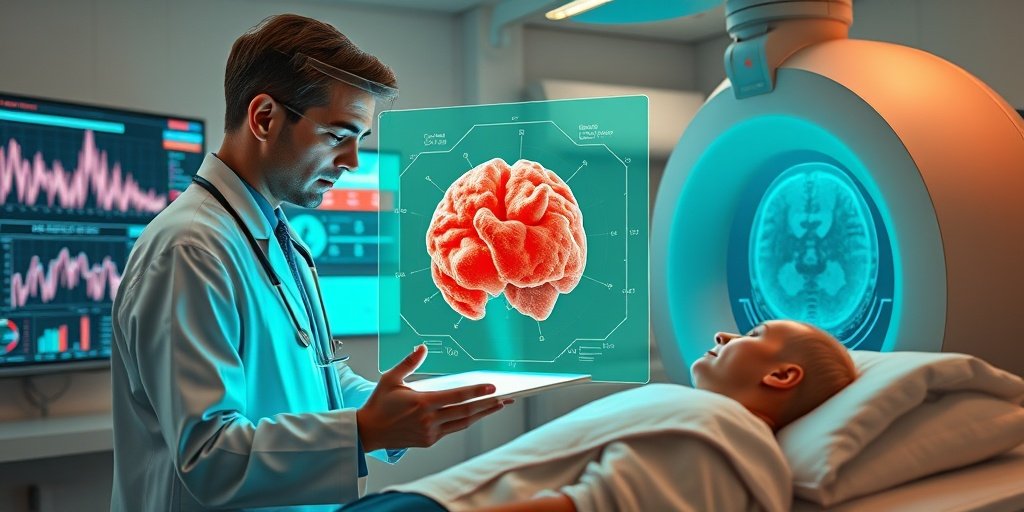⚡ Quick Summary
This review highlights the transformative role of artificial intelligence (AI) in oncology, covering its applications from risk assessment to supportive care. AI technologies are enhancing the accuracy of diagnosis and treatment planning, paving the way for more personalized cancer care.
🔍 Key Details
- 📊 Focus: AI applications across the cancer care continuum
- 🧩 Data Sources: Multi-omics and electronic health records
- ⚙️ Key Areas: Risk assessment, early detection, treatment planning, survivorship care
- 🏆 Challenges: Algorithm validation, data privacy, and bias mitigation
🔑 Key Takeaways
- 🤖 AI enhances cancer risk stratification and personalizes prevention strategies.
- 🩻 AI algorithms improve the accuracy of medical image analysis and histopathology.
- 🎯 Treatment planning is refined through AI, optimizing radiation therapy and systemic therapy selection.
- 💡 AI supports survivorship care by tailoring interventions and improving symptom management.
- 📈 Integration of AI into clinical workflows can streamline evidence dissemination and patient-reported outcomes.
- 🔒 Addressing challenges is crucial for successful AI implementation in clinical practice.
- 🤝 Interdisciplinary collaboration and education for healthcare professionals are essential for effective AI integration.
- 🌟 The synergy between AI and clinical expertise is vital for personalized cancer care.

📚 Background
The integration of artificial intelligence into healthcare, particularly oncology, is rapidly evolving. AI has the potential to revolutionize cancer care by enhancing various stages of the treatment continuum, from risk assessment to end-of-life care. As we harness the power of AI, it is essential to understand its capabilities and the challenges that accompany its implementation.
🗒️ Study
This review article provides a comprehensive overview of the current and emerging applications of AI in oncology. It discusses how AI-driven tools are being developed to integrate diverse data sources, such as multi-omics and electronic health records, to improve cancer risk stratification and personalize prevention strategies.
📈 Results
The findings indicate that AI algorithms are showing promise in augmenting the accuracy and efficiency of medical image analysis and histopathology interpretation. Furthermore, AI is being explored for its potential to enhance treatment planning and survivorship care, ultimately leading to improved patient outcomes.
🌍 Impact and Implications
The implications of AI in oncology are profound. By refining treatment planning and personalizing care, AI can significantly improve the quality of life for cancer patients. Moreover, the ability to streamline clinical workflows and enhance decision-making processes can lead to more efficient healthcare delivery. However, addressing the challenges of algorithm validation, data privacy, and bias is crucial for realizing the full potential of AI in cancer care.
🔮 Conclusion
This review underscores the transformative potential of AI in oncology, highlighting its applications across the cancer care continuum. As we move forward, it is essential to focus on responsible development and implementation of AI technologies to ensure they contribute positively to personalized and effective cancer care. The future of oncology looks promising with the integration of AI, and continued research in this field is vital.
💬 Your comments
What are your thoughts on the integration of AI in cancer care? We would love to hear your insights! 💬 Share your comments below or connect with us on social media:
Artificial intelligence across the cancer care continuum.
Abstract
Artificial intelligence (AI) holds significant potential to enhance various aspects of oncology, spanning the cancer care continuum. This review provides an overview of current and emerging AI applications, from risk assessment and early detection to treatment and supportive care. AI-driven tools are being developed to integrate diverse data sources, including multi-omics and electronic health records, to improve cancer risk stratification and personalize prevention strategies. In screening and diagnosis, AI algorithms show promise in augmenting the accuracy and efficiency of medical image analysis and histopathology interpretation. AI also offers opportunities to refine treatment planning, optimize radiation therapy, and personalize systemic therapy selection. Furthermore, AI is explored for its potential to improve survivorship care by tailoring interventions and to enhance end-of-life care through improved symptom management and prognostic modeling. Beyond care delivery, AI augments clinical workflows, streamlines the dissemination of up-to-date evidence, and captures critical patient-reported outcomes for clinical decision support and outcomes assessment. However, the successful integration of AI into clinical practice requires addressing key challenges, including rigorous validation of algorithms, ensuring data privacy and security, and mitigating potential biases. Effective implementation necessitates interdisciplinary collaboration and comprehensive education for health care professionals. The synergistic interaction between AI and clinical expertise is crucial for realizing the potential of AI to contribute to personalized and effective cancer care. This review highlights the current state of AI in oncology and underscores the importance of responsible development and implementation.
Author: [‘Riaz IB’, ‘Khan MA’, ‘Osterman TJ’]
Journal: Cancer
Citation: Riaz IB, et al. Artificial intelligence across the cancer care continuum. Artificial intelligence across the cancer care continuum. 2025; 131:e70050. doi: 10.1002/cncr.70050